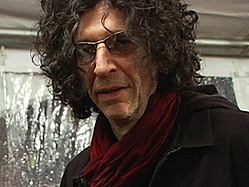Our long national nightmare is over. Howard Stern has been telling fans for months that he didn't know if he'd be back on the airwaves of Sirius XM satellite radio again when his contract was up on December 31. And, going into Thursday morning's (December 9) show, his ardent followers were getting anxious that they may only have five more chances to hear Stern before he disappeared from their cars and stereos for his next adventure ... or, Baba Booey-forbid, retirement.
Stern put their minds at ease on Thursday — but not before stringing them along with more than 35 minutes of artful stalling and red herrings that seemed to have some of his staff on the verge of passing out from nervousness — when he announced that after weeks of negotiations he has re-signed for five more years on satellite.
"We are continuing on," he finally announced, saying he feels he still has the "eye of the tiger" and that after surveying the current media landscape, he believes there's more left for him to do in radio. "I've signed a deal. ... I started to look at all the companies, Sirius included. And Sirius has been very, very anxious for me to re-sign. ... And I know deep down in my heart, I kept thinking I'd like to stay here. Because more than anything, I think what we've built hasn't been finished yet."
The stringing along continued as Stern crowed about the explosive growth of satellite radio since he joined five years ago. "I came to the conclusion after speaking to everyone that the real innovators and the real geniuses are the people here, that our home should be at Sirius satellite radio. ... My answer is that I will be here for the next five years."
The deals for his large supporting cast have not yet been cut, and Stern did not reveal the terms of his new contract. He did, however, say the new contract gives him more flexibility, and while there will be "plenty of show to go around," he did not say what that meant in terms of how many days he would work a week. "For now it's four days a week," he said. "But at some point it's going to change." The program will air from 6 a.m.- 10 a.m.; new shows currently air four days a week, with a "Best Of" on Friday mornings.
"I would like to continue this. I think this is the best home for [us]," Stern said. And then he made another big announcement: after years of frustration from fans about not being able to hear the show on the mobile phone applications, Stern said that, as of Thursday, the program will now be available on "any mobile device."
The jump to the Sirius XM mobile app was one of the keys, Stern said, to signing his new deal, since he believes the ability to get his show anywhere you are is the future of radio.
Explaining that the deal finally got closed on Wednesday, Stern, 56, said he told Sirius XM boss Mel Karmazin that after more than 30 years in broadcasting, he wasn't sure he wanted to stay in radio. "I told Mel that I wasn't sure that I wanted to continue working," he said. "That I had thoughts about retiring, going out on top. I feel we've done an amazing thing here at Sirius, and when history looks back on us it will say we gave birth to a new form of radio."
Milking the moment for all it was worth before finally spilling the beans, Stern apologized to long-time sidekicks Robin Quivers and Fred Norris for not telling them the news the previous night, admitting that, like most things in his life, he preferred to speak his mind on the air and share his thoughts with his fans as well. "I thought in the interest of good radio, which we've always put first, that I would say it on the air," he told Quivers. "So, forgive me for not saying this privately ... this isn't going to be easy to say. And I certainly couldn't look the fans in the eye and say it. This is going to be emotional, and I've never cried on the air and maybe this is going to be it."
Despite considering retirement, Stern said he recently concluded that he wanted to keep working and that an offer was on the table as of Wednesday. But then he got cold feet at the last minute, and as embarrassing as it was to admit it, he said he realized he loved playing chess and might be better off "going into the sunset." He even revealed that he's been in talks with his alma mater, Boston University, about becoming a professor and that two terrestrial radio companies had come to him and made offers.
"And so I decided with a lot of heavy heart to turn Mel down and go off into the sunset," he said. "Now, when I make my announcement, that could be my announcement," he teased.
Stern famously signed a five-year, $500 million contract with Sirius in 2004 that gave him $100 million per year to produce content on two channels. After years of being dogged with fines and restrictions by the FCC, the move to satellite in January 2006 liberated the famously profane radio veteran, allowing him to stretch the creative boundaries of his radio bits and freeing him to use the type of language and engage in the outrageous behavior that had earned him the "shock jock" honorific during his terrestrial radio days.
The announcement was something of a surprise, since just two days earlier Stern had unleashed a vicious tirade on Sirius XM's CFO after he felt that statements made by David Frear about at an investor seminar on Monday made it sound like the radio talker would have to take a pay cut if he were to re-sign with the network. "I know what I have done in this company," Stern raged. "I am not taking a f---ing paycut!"










